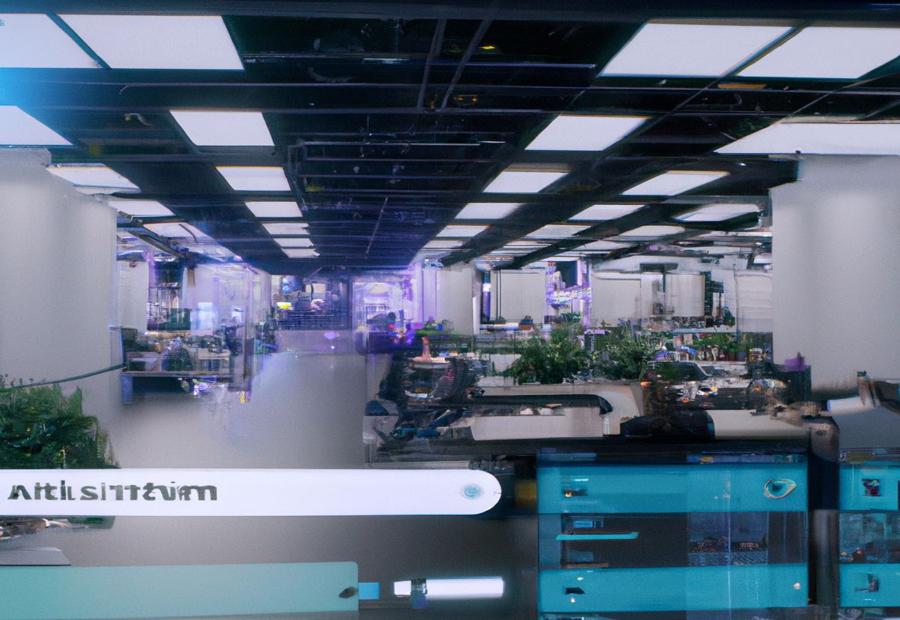Improving Call Center Efficiency with AI Chatbots
Key Takeaway:
- Improved customer satisfaction: AI chatbots in call centers provide quick and accurate responses, leading to increased customer satisfaction.
- Efficient call resolution: AI chatbots help improve call resolution rates and reduce wait times, resulting in a more efficient call center operation.
- Cost savings and automation: Implementing AI chatbots reduces the reliance on human agents, leading to cost savings through automation and increased operational efficiency.
Call centers play a pivotal role in customer service, but efficiency can often be a challenge. In this article, we’ll explore how AI chatbots can revolutionize call center operations. Discover the reasons behind the need for efficiency improvements in call centers and get to know how AI chatbots can effectively enhance productivity and customer satisfaction. Let’s dive into the world of call center optimization and the game-changing potential of AI chatbots.
Overview of call centers and the need for efficiency improvements
Call centers are essential for modern businesses, providing customer assistance. To meet the expectations of the digital age, efficiency within call centers needs to be improved. Customer inquiries and expectations for quick responses have increased. AI chatbots are the answer to this pressing need.
These virtual agents understand customer queries and provide quick and accurate responses. Using natural language processing (NLP) and machine learning, they analyze inquiries and offer solutions or information. This reduces wait times, improves resolution rates, and increases customer satisfaction.
AI chatbots also portray brands as technologically advanced and customer-centric. This creates customer loyalty and enhances the customer experience. Automating routine tasks reduces operational costs associated with hiring additional agents. Furthermore, AI chatbots can personalize customer interactions. This level of customization makes interactions more relevant, personalized, and meaningful.
AI chatbots revolutionize call centers, offering several benefits such as enhanced efficiency, improved customer satisfaction, and cost savings. Organizations must embrace this innovative solution to stay competitive. As technology advances, AI chatbots will continue to streamline processes and deliver personalized service. AI chatbots: Making call centers efficient and human interaction obsolete, one conversation at a time.
Introduction to AI chatbots and their role in improving call center efficiency
AI chatbots are revolutionizing call centers with their advanced capabilities. They provide quick and accurate responses which help to improve customer satisfaction. Machine learning and intent detection allow these chatbots to analyze inquiries and offer tailored solutions. Different levels of AI capabilities are available, from basic rules-based bots to more complex AI like IBM Watson Assistant. Vodafone is a great example of how this technology can lead to enhanced productivity and better customer interactions. AI chatbots are gaining increased popularity and it is projected that by 2031, they will handle a significant proportion of customer interactions. Gartner’s survey suggests that by 2023, customers will prefer AI-enabled chatbots to human agents for solving their issues. So get ready for a chatbot revolution!
Benefits of Using AI Chatbots in Call Centers
Using AI chatbots in call centers offers a variety of benefits that drive improved efficiency and customer experiences. From providing quick and accurate responses to enhancing brand reputation and loyalty, these chatbots have proven their worth. In addition, the automation and reduced reliance on human agents can lead to significant cost savings. Furthermore, the customization and personalization of customer interactions further elevate the effectiveness of AI chatbots in call centers.
Increased customer satisfaction through quick and accurate responses
AI chatbots are revolutionizing call centers. These advanced technologies use natural language processing and machine learning to provide fast and accurate customer responses. This means that customers no longer have to wait long periods of time for their inquiries to be answered. In addition, AI chatbots can customize their interactions with customers, offering them personalized recommendations and solutions.
Vodafone is a great example, having achieved improved call center efficiency by implementing IBM Watson Assistant. Businesses should take advantage of these AI chatbots to ensure quick and accurate responses, driving increased customer satisfaction.
AI chatbots: putting an end to long waits and resolving customer issues at lightning speed!
Improved call resolution rates and reduced wait times
AI chatbots are revolutionizing the call center industry, providing quick & accurate answers and leading to improved resolution rates & shorter wait times. With features like machine learning & intent detection, these chatbots help enhance efficiency & reduce operational costs. Industry projections suggest that by 2031, conversational AI will handle a substantial portion of interactions.
Collaborations between IBM & CcaaS providers are being established to simplify the integration of AI-powered virtual voice agents. This will streamline processes, create agent efficiency & deliver personalized service, contributing to improved call resolution rates & reduced wait times.
The use of AI chatbots not only enhances efficiency but also boosts brand reputation & customer loyalty. It’s like having a witty, reliable assistant on speed dial!
Enhanced brand reputation and customer loyalty
AI chatbots are essential for boosting a brand’s reputation and fostering loyalty with customers. They provide fast, accurate answers to queries, creating an effortless customer experience. Plus, AI chatbots can be programmed for personalised interactions, strengthening customer-brand relationships.
AI chatbots in call centers offer many benefits. Customers are satisfied with the quick responses to their questions. Plus, reduced wait times make customers feel valued and appreciated. Also, AI chatbots can be tailored for individual needs, making customers feel understood.
Businesses can save money by using AI chatbots to automate repetitive tasks and reducing reliance on human agents. This optimises call center resources and improves service quality across all customer interactions.
Industry trends show a growing embrace of conversational AI chatbots in customer service. By 2031, these virtual assistants are predicted to handle a large portion of call center interactions. IBM is working with CcaaS providers to create AI-powered virtual voice agents that integrate easily into existing systems.
Cost savings through automation and reduced reliance on human agents
Automation and reduced reliance on human agents can bring cost savings to call centers. AI chatbots can be integrated in customer service operations, streamlining processes and decreasing manual intervention. This leads to fewer human agents needed, making labor expenses lower.
Routine and repetitive tasks can be automated with AI chatbots, freeing up human agents to focus on more complex problems. This increases efficiency and reduces operational costs. Plus, AI chatbots can run 24/7 without breaks or holidays, meaning no extra costs for customer support.
AI chatbots can also handle multiple queries simultaneously, reducing wait times and improving call resolution rates. Customers get quick and accurate responses, leading to higher satisfaction levels.
In conclusion, automation and AI chatbot implementation can help companies cut costs while improving customer satisfaction. Streamlined processes and resource allocation can result in improved performance and profitability. So get ready for a VIP experience at the call center!
Customization and personalization of customer interactions
In today’s digital age, personalizing customer interactions is essential in the call center industry. AI chatbots play a huge role in providing tailored experiences. They can understand customer data, preferences, and past interactions, allowing them to give personalized responses and recommendations.
By gathering info from sources like CRM systems and customer profiles, AI chatbots generate unique, customized conversations that meet each customer’s exact needs and wants.
AI technology has made chatbots more skilled – they can hold meaningful conversations, recognize speech patterns, interpret tone and sentiment, and adjust their replies accordingly. This creates a personalized experience where customers feel understood and valued.
Moreover, AI chatbots have machine learning capability. With each customer exchange, they learn more and better understand customer preferences. This leads to more accurate personalized responses, improving the customer experience and strengthening the customer-brand relationship.
AI chatbots also allow customers to customize their interactions. For example, customers can choose their preferred communication channel or modify their conversation based on their personal needs. They can pick text-based chat instead of voice calls, or interact with a chatbot that speaks a certain language. AI chatbots put these custom choices in customers’ hands, making sure they’re in control.
From basic bots to advanced AI, call centers are upping their game to deliver better customer experiences with the help of artificial intelligence.
Levels of AI Capabilities in Call Centers
Discover the different levels of AI capabilities in call centers and how they enhance efficiency. From rules-based bots with limited response functions to level two AI with machine learning and intent detection, all the way to level three AI with advanced capabilities like IBM Watson Assistant, each sub-section in this section will unveil the varying advancements in AI technology and their impact on call center operations. So, let’s dive into the levels of AI capabilities that are revolutionizing how call centers function.
Rules-based bots with limited response functions
Rules-based bots are an AI chatbot type that have limited response functions. They work using a set of pre-defined rules and guidelines. Not like more advanced AI chatbots, rules-based bots cannot learn or adapt their responses over time. Instead, they depend on a fixed set of rules to reply to often asked questions and common issues.
- Rules-based bots do as programmed: They are built with certain rules and guidelines to reply to customer inquiries. These rules are often made by human agents and experts and are designed for usual scenarios customers may come across.
- Limited natural language processing: Rules-based bots generally have limited capabilities when it comes to understanding natural language input from customers. They count on keyword matching and simple patterns to interpret customer queries and generate relevant responses. As a result, these bots may battle with complex or vague requests, leading to less accurate or appropriate answers.
- No learning abilities: Unlike more advanced AI chatbots, rules-based bots do not possess the capacity to learn or enhance their answers over time. They cannot analyze past interactions or incorporate new information into their database. This implies that any changes or updates in info must be done by human agents, which can be time-consuming and can lead to obsolete or wrong responses.
In spite of these constraints, rules-based bots can still provide beneficial help in certain contexts. They are great at managing direct inquiries and giving quick replies to often asked questions. Moreover, as they work based on predetermined guidelines, these bots can make sure uniform messaging and brand voice across customer interactions.
Level two AI with machine learning and intent detection
Level two AI chatbots can use machine learning and intent detection to outperform rules-based bots. This allows them to analyze data, recognize patterns and trends, and provide the best possible response to customers.
These chatbots can detect what customers need and provide tailored answers. They learn from customer interactions and get smarter over time.
Level two AI also increases call center efficiency by reducing the need for human intervention. Chatbots handle a range of inquiries, leaving human agents to focus on more complex tasks. This reduces wait times, resulting in better customer service and satisfaction.
For example, Vodafone successfully used IBM Watson’s AI capabilities to improve its customer service. Watson’s machine learning algorithms enabled it to offer more personalized responses faster.
Overall, level two AI with machine learning and intent detection can significantly improve call center operations, providing better customer experiences.
Level three AI with advanced capabilities like IBM Watson Assistant
IBM Watson Assistant is a Level Three AI chatbot in call centers, offering advanced capabilities. It goes beyond simple rule-based responses and machine learning to understand natural language and context. It can also easily integrate with other systems and databases.
Watson Assistant has a vast knowledge base, enabling it to handle complex queries with detailed insights. This is made possible through the use of deep learning models. As such, agents can rely on it for accurate information and assistance with customer issues.
To ensure accuracy, it’s important to keep updating and training the system with real-world customer interactions. Vodafone may have found efficiency with Watson Assistant in their call centers.
Case Study: Vodafone’s Implementation of Watson Assistant
Vodafone’s successful implementation of Watson Assistant in their call centers serves as a compelling case study in leveraging AI chatbots for improving call center efficiency. Discover how Vodafone’s use of Watson Assistant revolutionized their operations, the features that contributed to efficiency, and the remarkable results achieved through this technology integration.
Overview of Vodafone’s use of Watson Assistant in their call centers
Vodafone, a telecom giant, has adopted Watson Assistant for their call centers. This AI-powered chatbot provides tailored responses and increases customer satisfaction. It cuts wait times and boosts call resolution rates, which ultimately saves time for both customers and agents. Automation features also lead to cost savings.
The implementation of Watson Assistant has had a huge impact on Vodafone’s call center operations. Improved customer interactions have reinforced the brand and increased loyalty. Machine learning and intent detection help customize interactions, meeting individual needs efficiently.
In the future, AI chatbots like Watson Assistant will be even more popular in the call center industry. By 2031, they could handle a big part of interactions. IBM and CcaaS providers are working together to simplify virtual voice agents.
Features and benefits of Watson Assistant in improving call center efficiency
Watson Assistant is a powerful AI chatbot created to boost call center performance by bringing several characteristics and advantages. With its sophisticated abilities, Watson Assistant enhances customer interactions and simplifies processes in call centers.
- A major trait of Watson Assistant is its capacity to supply fast and precise responses. By allowing call centers to instantly and accurately answer customer queries, Watson Assistant increases customer satisfaction drastically.
- Another benefit of Watson Assistant is its machine learning and intent detection capabilities, aiding call center agents in resolving customer issues more successfully. This leads to improved call completion rates.
- Moreover, Watson Assistant reduces customer wait times by automating answers and dealing with a large portion of interactions. Resulting in a faster and more efficient call center encounter.
- Plus, Watson Assistant contributes to increasing brand reputation through personalized service and customized interactions. By quickly and accurately addressing customer needs, Watson Assistant makes customers feel appreciated.
- Furthermore, Watson Assistant cuts back on human resources by automating tasks normally done by human agents. This brings about big cost savings for call centers without compromising on service quality.
Plus, Watson Assistant is an essential element in Vodafone’s call centers’ operations. By providing real-time information and guidance, Watson Assistant assists Vodafone agents in effectively handling customer inquiries. The introduction of Watson Assistant at Vodafone has resulted in better call center performance and provided agents with the means for outstanding customer service.
In conclusion, Watson Assistant offers a variety of features and benefits that improve call center efficiency, among them quick and accurate responses, increased call completion rates, lowered wait times, raised brand reputation, cost savings, and furnishing call center agents with the tools for extraordinary customer service.
Results and impact of implementing Watson Assistant at Vodafone
Vodafone’s implementation of Watson Assistant in their call centers has brought about great improvements. It has enabled more accurate responses to customer queries and led to higher customer satisfaction. Plus, wait times for customers have been reduced.
The AI chatbot has also improved the connection between Vodafone and its customers. It offers a personalized experience, solidifying Vodafone’s reputation as a reliable and customer-centric service provider.
Furthermore, Watson Assistant has resulted in cost savings for Vodafone. Automation has lowered the need for human agents, allowing for more efficient resource allocation. This has made operational processes more streamlined while still delivering good customer service.
AI chatbots are changing customer service. By 2031, they’ll be dealing with more interactions than customer service reps.
Industry Trends and Future Outlook

Photo Credits: Artificialintelligencechatbot.Ai by Adam Carter
The industry of AI chatbots in call centers is evolving rapidly, paving the way for improved efficiency and enhanced customer experiences. In this section, we will explore the latest trends and future outlooks in this space. We will delve into the growing adoption of conversational AI chatbots in customer service, the projection of AI handling a significant portion of interactions by 2031, exciting collaborations between IBM and CcaaS providers, and the potential of AI chatbots in streamlining processes and delivering personalized service. Get ready to discover the exciting future of call center operations!
Growing adoption of conversational AI chatbots in customer service
Conversational AI chatbots are getting adopted more in customer service, changing how businesses deal with their clients. These AI-powered bots offer a personalized and efficient approach. They give quick and accurate answers, making customers happy. With their ability to manage a lot of conversations, conversational AI chatbots have become an essential tool for call centers.
They help improve customer satisfaction and call center efficiency. They figure out customer needs quickly, reducing wait times. This leads to higher loyalty and a better company reputation. AI can automate processes, lessening the need for human agents and making operations more efficient.
AI levels vary, with basic response functions and more advanced options like IBM Watson Assistant that can handle complex questions. Watson Assistant can streamline processes, create better agent efficiency, and give personal service. One example is Vodafone using Watson Assistant that improved call center efficiency and customer satisfaction.
The adoption of conversational AI chatbots is showing how useful they can be. By 2031, it’s expected that they’ll take care of a big portion of conversations. IBM and CcaaS providers are teaming up, making AI-powered virtual voice agents easier to use for call centers. This could mean talking to a machine is more satisfying than talking to a human in the future.
Projection of conversational AI handling a significant portion of interactions by 2031
Conversational AI is projected to be a big part of customer service by 2031. AI chatbot tech is getting better at responding to customer queries and giving accurate answers quickly. This means more people will rely on these chatbots, leading to improved customer satisfaction.
AI chatbots are helpful for call centers. With machine learning and intent detection, they can give fast, accurate answers. This means shorter wait times, higher resolution rates, and happy customers. Plus, AI chatbots can create a positive experience that builds brand trust and loyalty.
Vodafone is a great example. They implemented IBM Watson Assistant in their call center. This allowed their virtual agents to respond accurately and reduce human error. It also made their metrics better, like faster call resolution and lower average handling time.
The future of AI chatbots in the call center industry looks bright. More and more organizations are using them to save money while keeping consistent service quality. Plus, as technology advances, we’ll see more focus on delivering personalized service through AI-powered voice agents.
Collaboration between IBM and CcaaS providers to simplify AI-powered virtual voice agents
IBM and CcaaS providers are partnering to make AI-powered virtual voice agents simpler to use in call centers. Together, these two technology leaders are providing user-friendly interfaces and intuitive platforms. This makes it easier for businesses to integrate these advanced conversational AI tools into their customer service operations.
The collaboration between IBM and CcaaS providers includes close collaboration between IBM’s Watson Assistant platform and CcaaS expertise. They are leveraging natural language processing (NLP) and machine learning algorithms to enhance chatbot performance. This will create more accurate and responsive bots, which can handle complex customer queries and conversations.
IBM and CcaaS providers aim to make Watson Assistant more accessible and customizable. This supports call centers in delivering personalised customer experiences, improving call resolution rates, reducing wait times, and increasing customer satisfaction.
In short, this collaboration is about simplifying the use of AI-powered virtual voice agents in call centers. This will help businesses optimise call center efficiency and improve customer service experiences with personalised interactions and better outcomes.
Potential of AI chatbots in streamlining processes, creating agent efficiency, and delivering personalized service
AI chatbots are here to help call centers! Streamlining processes, improving agent efficiency, and delivering personalized service – these bots can do it all! Automating tasks and providing quick & accurate responses, they can reduce the workload of human agents. Plus, their ability to handle inquiries efficiently helps reduce customer wait times.
On top of that, AI chatbots also offer personalized service. With machine learning and intent detection capabilities, they can understand customer preferences, giving tailored responses. This customization enhances customer experience with relevant info & solutions.
Call centers need to embrace this technology! By implementing AI-powered virtual voice agents, like IBM Watson Assistant, they can improve efficiency and customer service. Staying updated with industry trends and collaborating with providers like IBM is key.
Ultimately, embracing AI chatbot tech early on will put companies ahead of the competition. They’ll be seen as industry leaders while also ensuring efficient & tailored service for each customer. AI chatbots: The saviors of call centers!
Conclusion
In the conclusion, we summarize the benefits and capabilities of AI chatbots in call centers, highlighting the importance of improving call center efficiency in the digital age. We also share our final thoughts on the future prospects of AI chatbots in the call center industry.
Recap of the benefits and capabilities of AI chatbots in call centers
AI chatbots in call centers provide various advantages and abilities that boost operational effectiveness. These chatbots not only give speedy and precise answers to customer inquiries but also help boost resolution rates and reduce wait times. One key gain is improved customer satisfaction, which leads to a better brand image and increased customer loyalty. Moreover, AI chatbots in call centers bring about cost savings by way of automation and lessened reliance on human agents. Additionally, they assist in customization and personalization of customer interactions, making them beneficial for any call center.
The utilization of AI chatbots in call centers can fall under different levels of capabilities. At the primary level, there are rules-based bots with restricted response functions. These bots abide by pre-defined rules to answer basic questions from customers. Stepping up to level two AI, machine learning and intent detection techniques are implemented allowing chatbots to learn from past conversations with customers for more precise answers. At level three, advanced functions such as IBM Watson Assistant become active, enabling call centers to use refined features like natural language processing and understanding.
Vodafone’s adoption of Watson Assistant illustrates the effect of using advanced AI chatbot technology in a call center setting. By utilizing Watson Assistant, Vodafone managed to streamline their operations, increase call center efficiency, and enhance customer service experiences. The abilities provided by Watson Assistant contributed significantly to achieving these goals by delivering personalized responses that fit each individual customer’s needs.
It is anticipated that conversational AI will handle a big part of interactions by 2031. To make simpler and boost the capacities of virtual voice agents powered by AI, collaborations between companies such as IBM and CcaaS providers are becoming more common.
AI chatbots present a dependable solution when it comes to streamlining processes, creating agent efficiency, and offering personalized service. As call centers strive to enhance their efficiency in the digital age, AI chatbots offer invaluable help. With their capacity to give quick and accurate responses, reduce wait times, and enhance customer satisfaction, AI chatbots have become an indispensable part of call center operations. The future of this technology in the call center industry is positive as more organizations recognize the benefits and capabilities it offers.
Nobody likes being on hold and listening to the same elevator music from the 90s while waiting for a response, so streamlining call center efficiency with AI chatbots is crucial in today’s digital age.
Emphasis on the importance of improving call center efficiency in the digital age
Nowadays, improving call center efficiency is super important. Customers have growing demands and expectations that must be met effectively. AI chatbots can help with this.
Technology has made it clear that only using human agents isn’t enough. Chatbots are a crucial tool for improving call center efficiency. They give quick and accurate replies to customer queries and needs, shortening wait times and providing personalized interactions.
The advantages of AI chatbots in call centers are various. Firstly, they increase customer satisfaction by quickly and accurately dealing with their inquiries. This gets rid of the need for customers to wait or be moved around to different agents.
Second, AI chatbots improve resolution rates and lessen wait times by managing a lot of customer interactions. With machine learning and intent detection, these chatbots understand customer questions quickly and provide relevant information without delay.
Furthermore, integrating AI chatbots into call centers boosts brand reputation and client loyalty. Customers are grateful for efficient and personalised conversations tailored to their particular needs. By offering customised solutions and predicting customer preferences through AI, call centers can make a positive image that creates loyalty.
Moreover, AI chatbots bring cost savings to organisations. Automation lowers the need for human agents, allowing chatbots to handle several conversations at once without getting tired or having capacity restrictions. This makes operations smoother, cuts staffing costs, and keeps consistent service quality.
In addition, AI chatbots make it possible to customize and personalise customer interactions. With capabilities like IBM Watson Assistant, these chatbots can link with existing systems and access customer data. This allows them to give tailored answers based on each person’s experience with the organisation, making the overall customer experience better.
To make sure AI chatbots work well in call centers, it’s important to regularly analyse and optimise their performance. Updating their knowledge base with the newest information and making sure they have the latest data will give customers accurate and up-to-date answers.
All in all, enhancing call center efficiency is essential in the digital age. AI chatbots play a massive role in doing this by providing fast and accurate replies, reducing wait times, and delivering personalized interactions. Their integration into call centers increases customer satisfaction, lowers costs, boosts brand reputation, and allows for customization of customer interactions. By constantly analysing and optimising their performance, call centers can make sure AI chatbots work as efficiently as possible.
Final thoughts on the future prospects of AI chatbots in the call center industry
AI chatbots boast a bright future in the call center industry. They revolutionize customer interactions with fast and accurate responses, leading to higher satisfaction. Plus, they reduce wait times and boost efficiency. AI chatbots streamline processes and optimize agent efficiency, delivering personalized service. By 2031, projections suggest conversational AI will handle a large portion of interactions.
The adoption of AI chatbots is growing, driven by the need for efficient and personalized interactions. IBM and CcaaS providers work together to simplify implementation and integrate AI-powered virtual voice agents with existing systems. AI chatbots can elevate brand reputation and customer loyalty with captivating, customized interactions.
Vodafone used IBM Watson Assistant with machine learning and intent detection. The result? Improved efficiency and increased customer satisfaction.
AI chatbots promise to revolutionize customer interactions and improve overall call center efficiency. Collaborative efforts ensure seamless integration with existing systems. Plus, personalized interactions create a more engaging experience, strengthening customers’ bond with the brand. Vodafone’s success proves the tangible benefits of AI chatbots in call centers.
Some Facts About Improving Call Center Efficiency with AI Chatbots:
- ✅ Conversational AI chatbots in call centers can increase customer and agent satisfaction, improve call resolution rates, and enhance brand reputation. (Source: Team Research)
- ✅ IBM Watson Assistant, an example of level three AI, offers powerful AI capabilities with features such as natural language understanding, intent detection, and advanced analytics. (Source: Team Research)
- ✅ According to a Gartner report, conversational AI chatbots and virtual assistants are projected to handle 30% of interactions by 2031, up from 2% in 2022. (Source: Team Research)
- ✅ AI chatbots in customer service provide benefits such as speed and efficiency, 24/7 availability, personalization, cost-effectiveness, and improved customer engagement. (Source: Netguru)
- ✅ AI in call centers can automate routine processes, provide virtual agents for customer queries, deliver personalized experiences, and improve call center metrics such as revenue, cost, and customer ratings. (Source: TechTarget)
FAQs about Improving Call Center Efficiency With Ai Chatbots
How can conversational AI solutions improve call center efficiency?
Conversational AI solutions can improve call center efficiency by increasing customer and agent satisfaction, improving call resolution rates, and reducing costs. With features such as 24/7 support, speedy response times, and best-in-class natural language understanding, conversational AI solutions like IBM Watson Assistant can streamline processes, create agent efficiency, and deliver higher quality personal service.
What are the benefits of using AI chatbots in customer service?
The benefits of using AI chatbots in customer service include speed and efficiency, 24/7 availability, personalization, cost-effectiveness, multilingual support, scalability, improved data collection, enhanced customer engagement, and improved brand image. AI chatbots can handle a wide range of customer inquiries and support needs, making it easier and more convenient for customers to interact with businesses.
How can AI improve customer experiences and call center efficiency?
AI can improve customer experiences and call center efficiency by automating routine processes, providing virtual agents or chatbots for customer queries, delivering personalized experiences, and offering predictive analytics. AI-powered virtual assistants can provide immediate personalized responses, reduce customer wait time, and increase agent efficiency. Predictive routing ensures calls are directed to the best agent for customer success, while sentiment analysis determines when a call needs to be escalated.
What are the key trends in call center operations?
Key trends in call center operations include omnichannel solutions, workforce optimization tools, self-service channels, AI tools, advanced analytics and reporting, automatic verification of users, and deep personalized customer insights. The future of call centers also involves AI-powered virtual assistants and chatbots, voice recognition, sentiment analysis, augmented reality, and integration with the Internet of Things.
How can AI chatbots benefit the retail and hospitality industries?
AI chatbots can benefit the retail and hospitality industries by providing 24/7 availability, personalized experiences, multilingual support, improved data collection, enhanced customer engagement, and improved brand image. By adopting AI chatbots, businesses in these industries can meet customer expectations, reduce costs, and improve customer satisfaction.
How can AI help address agent shortages in contact centers?
AI can help address agent shortages in contact centers by automating routine tasks and providing virtual assistants or chatbots to handle customer queries. This reduces the workload on human agents and allows them to focus on more complex issues, resulting in increased agent efficiency and improved customer satisfaction.
AI Chatbot Team







